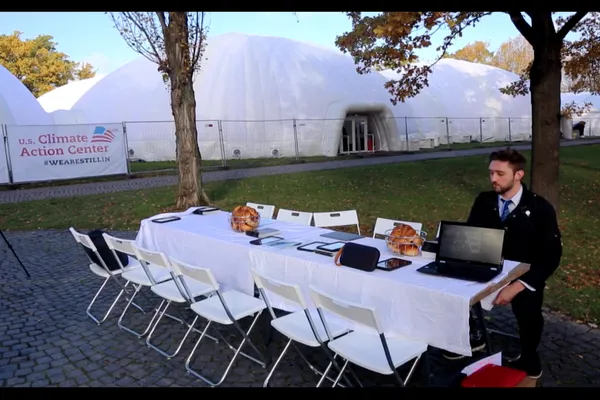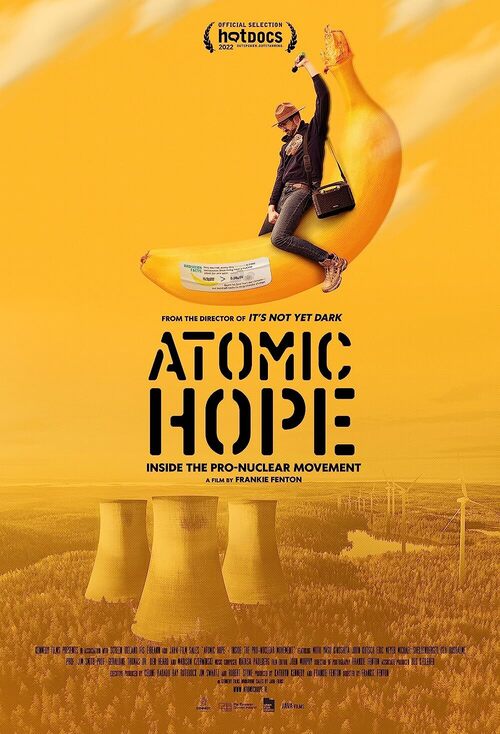Eye For Film >> Movies >> Atomic Hope (2022) Film Review
Atomic Hope
Reviewed by: Jennie Kermode

These days, pretty much everyone except the hardcore fringe of science deniers accepts that climate change is real and we need to find solutions fast. There are plenty of good films out there about emerging renewables and biofuel technologies, but documentary maker Frankie Fenton has chosen a more challenging subject. Screening as part of Docs Ireland 2023, this is an intimate look at advocates of a nuclear solution.
It opens with a man from Nagasaki reflecting on the legacy of nuclear damage. There is plenty of worry out there. After the Fukushima incident, Germany decided almost overnight to ditch its nuclear programme and focus on renewables. That, claim these scientists, was an overreaction. They appreciate that there is some risk, but feel that it needs to be balanced against the very real and immediate risks from climate change. Though it’s too late to prevent that now, we can still mitigate the damage, potentially saving billions of lives in the process. Compared with that, the loss of the occasional city might seem like a good deal, but human minds and emotions are not really built to work on that scale.

Nuclear reactors, we are told, are not as dangerous as they seem. There’s a good case to be made for this as far as third generation ones are concerned, but that doesn’t get much focus here. Instead there’s a big focus on Chernobyl, endeavouring to rewrite the popular history of the famous 1986 explosion. This is fair as far as it goes, noting that only a small number of exposed workers at the plant died from acute radiation poisoning and that fears of mass deaths in the surrounding population did not come true, but the focus on deaths distracts from other concerns, which don’t get mentioned at all, such as the massive increase in childhood thyroid cancers and in mutations in children and young animals, which have significantly increased disability in the region.
This feels rather disingenuous until the film takes us on a trip to the site and boasts of how the amount of radiation one absorbs there in a day is less than one would get from a dental x-ray. It is generally advised that dental x-rays be limited to one per year. One wonders if Fenton really understood the subject at all, or if the film’s participants were simply taken at their word.
This is a shame, because the film is, in other ways, a really interesting portrait of a group of people advocating for a cause which has little popular support, with the not unreasonable goal of saving the world. They admit that they have no idea how to organise a movement and lament their shortage of resources. If they did know how to organise a movement, they’d realise that they’re unusually well off in the latter department, giving away snacks to the public when most campaigners can’t even afford the stalls from which to do so. Aware that they are mostly white men, they have a commendable commitment to improving their diversity, but they don’t seem to have thought about why it might be lacking – for instance, that women tend to worry more about birth defects, or that people of colour are more likely to be poor and therefore more likely to end up living near power stations – the overall risk may indeed be low, but it is not evenly distributed.
There is more savvy here than in some similar communities. They have no truck with thorium purists – lovely though that approach might be, the technology is not ready yet, and we need to act straight away. (Of course, it takes quite a bit of time to get a conventional reactor up an running too, but not to the point that it couldn’t still make a difference.) Thorium will be useful in the future, they suggest, if we plug the gap with the materials we are already able to use.
Therein, however, lies the biggest problem, and it’s rather shocking that it doesn’t get a mention. The bulk of geological surveys done on fissile material suggest that there simply isn’t enough of it close enough to the Earth’s surface for realistic mining operations to reach it. What we can access might last us a century or two but then we would be back to square one. Ultimately, nuclear power is not a sustainable solution. It might be part of the immediate solution, but the case for that cannot be effectively made by people who are advocating a pipe dream. It’s a beautiful dream. For those of us who have spent all our lives aware of climate change, the idea of being able to relax one day and truly believe that it’s all going to be alright (or at least not any more wrong) is very appealing. It’s just not realistic.
If the scientists in this group have a counterargument (difficult though it is to see where that could come from), we don’t hear it. Atomic Hope is intriguing as a portrait of a movement, but falls well short as an interrogation of a scientific proposition. Its criticism of renewables is trite and takes no account of battery technology (including green battery technology), which is currently one of the most rapidly advancing areas of tech. Like Jeff Gibbs’ Planet Of The Humans, it gives the worrying impression of functioning as a vehicle for people trying to get an idea into the public sphere through the back door. Most film critics – and most documentarians – do not have scientific training and are all too easily persuaded of ideas which would not stand up to peer review. Science documentaries have an important role to play but need to be approached with caution.
Reviewed on: 21 Jun 2023
















